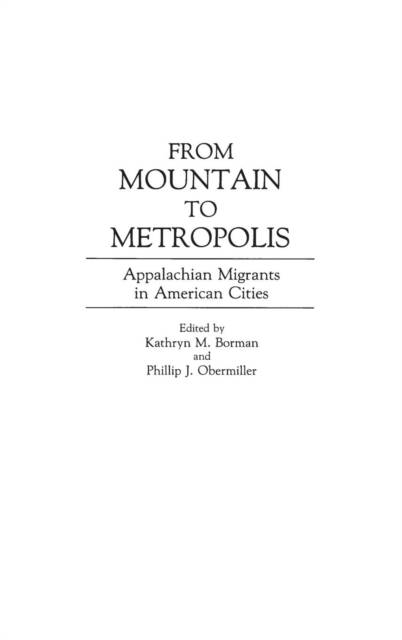
- Afhalen na 1 uur in een winkel met voorraad
- Gratis thuislevering in België vanaf € 30
- Ruim aanbod met 7 miljoen producten
- Afhalen na 1 uur in een winkel met voorraad
- Gratis thuislevering in België vanaf € 30
- Ruim aanbod met 7 miljoen producten
Zoeken
From Mountain to Metropolis
Appalachian Migrants in American Cities
Kathryn Borman, Phillip Obermiller
Hardcover | Engels
€ 144,45
+ 288 punten
Omschrijving
This volume focuses on Appalachians as a case study of internal migration in developed countries. Since World War II, Appalachian miners have left the coal towns of their mountain region for the car towns of Michigan, Ohio, Indiana, and Illinois. Migrations have ebbed and flowed with economic expansion and recession. Some descendants who are several generations removed from the migration experience do not identify with their mountainous background, but many urban Appalachians have maintained their cultural ties to the region and its values. This collection of essays is the fourth in a series of studies of Appalachian society in relation to mainstream America. While earlier works have concentrated on the migration process, jobs, housing, and ethnic group formation in urban settings, this volume addresses the important issues of health, environment, and education in the urban Appalachian context. As such, it is the only resource available for educators and health and human service professionals involved with this social sector.
Specificaties
Betrokkenen
- Auteur(s):
- Uitgeverij:
Inhoud
- Aantal bladzijden:
- 248
- Taal:
- Engels
Eigenschappen
- Productcode (EAN):
- 9780897893671
- Verschijningsdatum:
- 14/03/1994
- Uitvoering:
- Hardcover
- Formaat:
- Genaaid
- Afmetingen:
- 156 mm x 234 mm
- Gewicht:
- 526 g

Alleen bij Standaard Boekhandel
+ 288 punten op je klantenkaart van Standaard Boekhandel
Beoordelingen
We publiceren alleen reviews die voldoen aan de voorwaarden voor reviews. Bekijk onze voorwaarden voor reviews.











